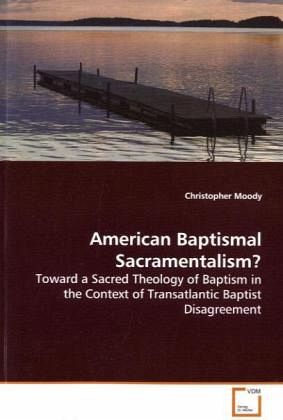
American Baptismal Sacramentalism?
Toward a Sacred Theology of Baptism in the Context of Transatlantic Baptist Disagreement
Versandkostenfrei!
Versandfertig in 6-10 Tagen
52,99 €
inkl. MwSt.

PAYBACK Punkte
26 °P sammeln!
The key to restoring the uniqueness of Baptism forSouthern Baptists resides in using the tension between the burgeoningrevival of British baptismal sacramentalism and thelong-standing suspicion toward all things sacramental among AmericanBaptists in order to understand and advance traditional baptismaldistinctiveness. The book first develops a baptismal typology byevaluating the various differences between the 5 models of Reformationsacramentalism: Roman Catholic Efficacy, Luther s Inauguration,Calvin s Seal, Zwingli s Symbol-Only, and the Anabaptists Faith-Baptism. It then examines the unifie...
The key to restoring the uniqueness of Baptism for
Southern Baptists
resides in using the tension between the burgeoning
revival of
British baptismal sacramentalism and the
long-standing suspicion
toward all things sacramental among American
Baptists in order to
understand and advance traditional baptismal
distinctiveness. The
book first develops a baptismal typology by
evaluating the various
differences between the 5 models of Reformation
sacramentalism:
Roman Catholic Efficacy, Luther s Inauguration,
Calvin s Seal,
Zwingli s Symbol-Only, and the Anabaptists
Faith-Baptism. It then
examines the unified voice of American Baptists
intent on retaining
anti-sacramental language and theology. American
Baptists tend to
follow an Anabaptist view of Baptism namely a
testimony of faith.
In Great Britain, however, Baptists are more open to
use sacramental
language and many have embraced a refined version of conversion
Baptism very similar to that proposed by the American
Restorationist tradition. The book champions a sacred theology of
Baptism and interprets it as an ordained sign with
sacred
significance.
Southern Baptists
resides in using the tension between the burgeoning
revival of
British baptismal sacramentalism and the
long-standing suspicion
toward all things sacramental among American
Baptists in order to
understand and advance traditional baptismal
distinctiveness. The
book first develops a baptismal typology by
evaluating the various
differences between the 5 models of Reformation
sacramentalism:
Roman Catholic Efficacy, Luther s Inauguration,
Calvin s Seal,
Zwingli s Symbol-Only, and the Anabaptists
Faith-Baptism. It then
examines the unified voice of American Baptists
intent on retaining
anti-sacramental language and theology. American
Baptists tend to
follow an Anabaptist view of Baptism namely a
testimony of faith.
In Great Britain, however, Baptists are more open to
use sacramental
language and many have embraced a refined version of conversion
Baptism very similar to that proposed by the American
Restorationist tradition. The book champions a sacred theology of
Baptism and interprets it as an ordained sign with
sacred
significance.












